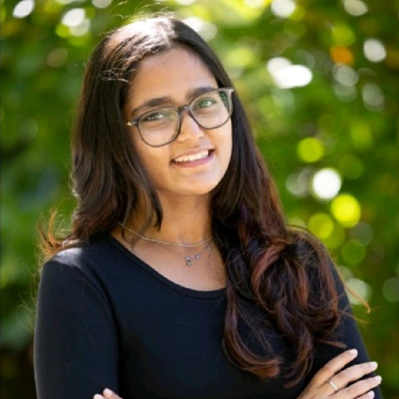From Hyderabad to Harvard: Diya Susan Thomas’s Quest in Neural Integration

Diya Susan Thomas, a graduate of BITS Pilani (Hyderabad. ‘24) with a M.Sc. in Biological Sciences and a B.E. in Electrical and Electronics, has demonstrated remarkable dedication to research and innovation. Her journey encompasses internships at prestigious institutions like CSIR, Kyoto University, and the University of Pittsburgh, where she gained invaluable experience in data analysis and neuroscience. Diya's transition from BITS Pilani to Harvard exemplifies her commitment to academic excellence and her passion for integrating computational research with biological sciences. A proud BITSian, Diya continues to inspire with her contributions to cutting-edge research and her vision for the future of interdisciplinary studies.
Being part of a COVID-affected batch, how did it change your college experience?
During the first year, second semester, right after Holi, we got an email saying we had to vacate our hostels. We were all quite hopeful that we'd be back in 3-4 months, but it turned out to be one and a half years. Besides the usual "new normal" and virtual classes everyone faced, being a bio student was particularly tough. In our second year, we had most of our bio subjects, most of which were lab courses. Sitting and staring at a screen for 3-4 hours was challenging watching someone else do lab work. We missed out on a lot of practical lab experience. On the bright side, we have a lot of time to ourselves. Many of us did Coursera courses and had opportunities to learn more about our lives. That was probably the only silver lining of COVID.
You headed BITS Embryo as Secretary during the COVID times. How do you find roles in clubs or departments important for BITSians?
In my second year, I dropped out of most clubs because I got drawn towards one particular club —BITS Embryo. Again, everything was remote, so I had no real-time experience apart from my first ATMOS. Honestly, I think the importance people give to club roles is a bit exaggerated, especially if you're aiming for research. Sure, extracurriculars add fillers to your resume and enhance your college experience, but they don't contribute much to your job prospects, in my opinion. Maintaining a good CGPA is more critical, especially for placements.
What made you decide to pursue research? Could you highlight research opportunities in India and abroad?
Colleges in India tend to have an industry bias, so many people don't venture into new areas, even if they're interested. BITS offers many opportunities, but talking to seniors and professors was vital for me. In my second year, I joined ARC and met seniors doing research in electronics. That's when I realized research is a viable career path. COVID taught me that remote research is possible. While I couldn't crack any research programs abroad initially because my resume was pretty empty, I did find an internship at Kyoto University, where we worked on data mining and paper analysis.
You've interned at CSIR, Kyoto University, and the University of Pittsburgh. What was your experience like? Do you have any fond memories?
It wasn't all that encouraging. At CSIR, we picked up a toy project from MATLAB for our PS1 project. PS1 was remote for the first time due to COVID-19, so it was the same experience for everyone. Kyoto kept me busy, but it wasn't fruitful—mostly just doubts and learning different things on Coursera.
How was your experience at Harvard?
Amazing. I got Harvard's acceptance within the first two days of the results. Ivy League universities don't provide housing, so you have to figure that out yourself. Luckily, I was funded and paid, which helped because it's costly, even for a six-month thesis. It would be best if you were candid with your professor about funding. I went to Harvard during winter, and it felt like Hogwarts. Harvard students are very active and constantly doing new things and achieving new feats. It was a good experience, meeting a lot of undergrads who were doing extraordinary things.
How would you describe your transition from BITS to Harvard? What are the major differences?
From a teaching standpoint, students and teachers at Harvard have a highly mutual, symbiotic connection. Students study to learn and understand, not just for grades. They don't mind spending extra time to figure out what's wrong with their method and how to improve. The approach to education is more about learning and less about grades, unlike here, where it's very CG-based.
Tell us about your projects and the domains your research is focused on.
At MITACS, I did a bioinformatics and immunology internship using Python and Ruby for data analysis. My next step was more advanced in neuroscience. There's a lot of computational research in neuroscience, and if you're into CS but don't want to work for a corporation, research teams can be a good fit. I did my thesis in systems neuroscience, which involves a lot of coding and wet lab experience. It's great to see both areas merging, making the research relevant to various fields.
You Might Also Like
- From Civil Engineering to Robotics: Jai Krishna’s Multi-Disciplinary Research Journey
- From BITS Pilani to Product Management: Adiban Samy Aravindan’s Journey of Innovation and Leadership
- Genesis of VisitHealth: A Journey from Campus to Healthcare Innovation
- From Engineering to Marketing Analytics: Rohan Cherthedath on Career Transitions, Skills, and Lessons from BITS Pilani to Marriott International
- Charting New Paths: From Physics to Finance — A Journey of Discovery with Harsh Vijay


 An Institute of Eminence
An Institute of Eminence






